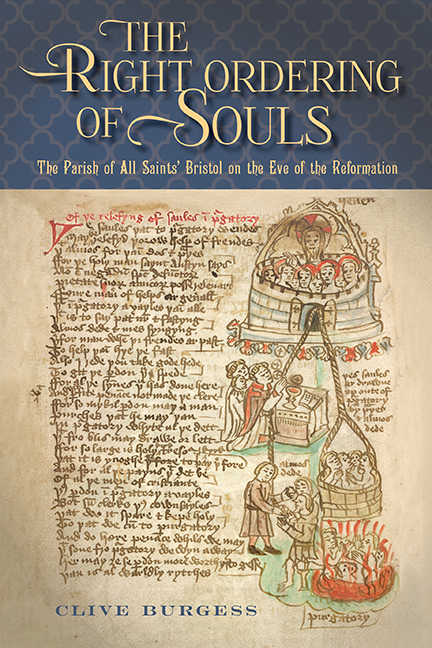Book contents
- Frontmatter
- Dedication
- Contents
- List of illustrations
- Acknowledgements
- Miscellaneous Frontmatter
- Abbreviations
- Notes
- map
- Part I For the increase of the divine service
- Part II All Saints’, Bristol, and its parishioners
- 2 ‘To be showed and declared’: Circumstances and sources
- 3 ‘According to the usage there’: Reading testamentary evidence
- 4 ‘Since his decease’: The widows’ might
- 5 ‘God amend them’: The parish wronged
- Part III Commemorating the dead
- Part IV Leaders and administrators
- Part V Ordering the parish
- Appendices
- Bibliography
- Glossary
- Index
- Miscellaneous Endmatter
3 - ‘According to the usage there’: Reading testamentary evidence
from Part II - All Saints’, Bristol, and its parishioners
Published online by Cambridge University Press: 05 May 2018
- Frontmatter
- Dedication
- Contents
- List of illustrations
- Acknowledgements
- Miscellaneous Frontmatter
- Abbreviations
- Notes
- map
- Part I For the increase of the divine service
- Part II All Saints’, Bristol, and its parishioners
- 2 ‘To be showed and declared’: Circumstances and sources
- 3 ‘According to the usage there’: Reading testamentary evidence
- 4 ‘Since his decease’: The widows’ might
- 5 ‘God amend them’: The parish wronged
- Part III Commemorating the dead
- Part IV Leaders and administrators
- Part V Ordering the parish
- Appendices
- Bibliography
- Glossary
- Index
- Miscellaneous Endmatter
Summary
INVESTIGATIONS of religious belief and behaviour in England in the century and more before the Reformation, and especially studies either of particular towns or rural locations, have tended to rely upon contemporary wills. Not only do large numbers of these documents survive but they also shed welcome light on personal circumstances and, more importantly, on individuals’ convictions and preferences. Wills provide an acceptable means for introducing some of the more important ‘players’ within All Saints’ and also establishing a basic understanding of aspects of their conduct. Nevertheless, much testamentary material has clearly been lost. Some forty wills survive for All Saints’ parishioners for the period 1400–1550, with notably sparse coverage for those dying in the first part of the period. While wills generally tend to reflect the wealthier ranks of parish society, even among so small a sample variety is evident. Some testators occupied themselves mainly with family interests, concentrating on inheritance strategies to the neglect of any detailed spiritual provision. Others, although evidently wealthy, left brief and uninformative wills, while a few, of apparently moderate estate, made much more detailed prescription. Moreover, while the great majority of testators depended heavily upon their parish, one or two did not. Of the latter, some had only recently ‘married into it’, like Joan Wilteshire, who exhibited a stronger allegiance to her former parish, St Mary le Port; and some evinced a closer allegiance to the fraternity of the Kalendars within All Saints’ or, simply, to another parish.
Although we tend to use the term ‘will’ as a catch-all, these documents should strictly be classified as last wills and testaments, dealing respectively – but, ordinarily, in no necessary order – with the devise of real property and/or the bequest of money and movables, often for pious purposes. Occasionally, however, the suspicion creeps in that a particular will, without any statement to the effect, in fact deals with only part of the testator's estate.
- Type
- Chapter
- Information
- 'The Right Ordering of Souls'The Parish of All Saints’ Bristol on the Eve of the Reformation, pp. 83 - 118Publisher: Boydell & BrewerPrint publication year: 2018

